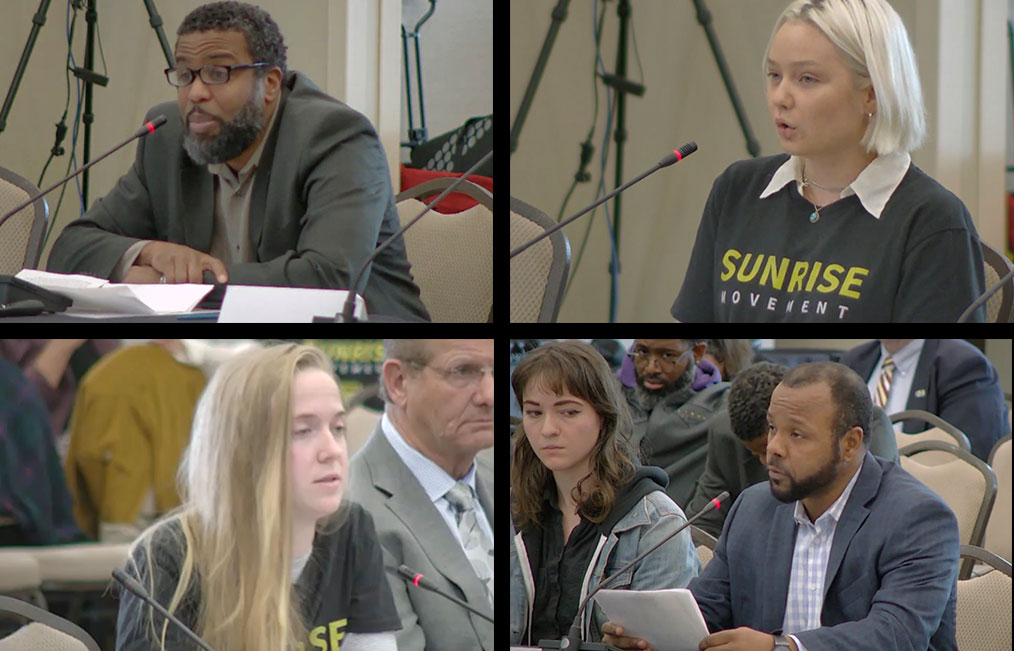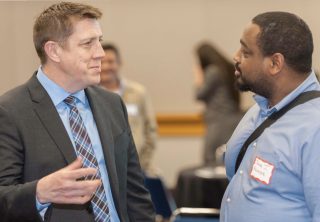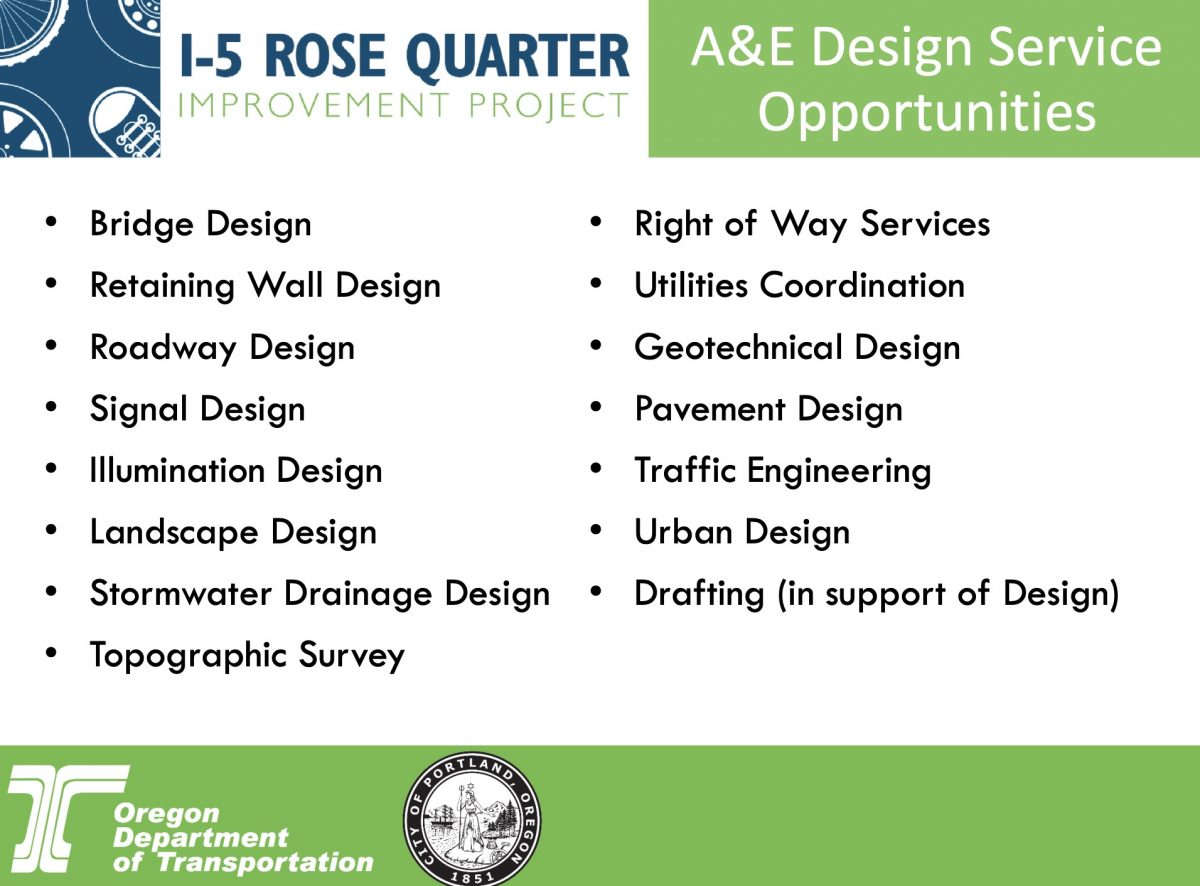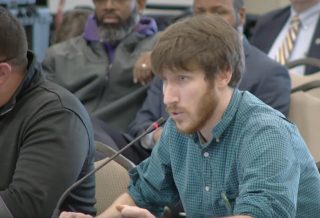
The Oregon Transportation Commission has decided to delay a key environmental review decision on the I-5 Rose Quarter project.
After hearing about an hour of emotional testimony at their meeting in Lebanon today (about 100 miles south of Portland), OTC Chair Robert Van Brocklin said, “We need time to absorb that additional comment… There are a number of values at play here… We’re not trying to railroad something through without listening, and we’re not going to.”

“Let there be no delays. Opportunity for jobs and economic prosperity for African-American contractors is vital.”
— Mat Hennessy, Vancouver Avenue First Baptist Church
The five-member OTC is a governor-appointed body that oversees the Oregon Department of Transportation. The OTC has been tasked with deciding whether or not ODOT can move forward into design and engineering of the $500 million project, or whether more analysis of the project’s impacts is needed. Last Friday, Portland Mayor Ted Wheeler, Multnomah County Commissioner Jessica Vega Pederson, and Metro President Lynn Peterson joined a long list of organizations and electeds by calling for completion of an environmental impact statement (EIS) — a more in-depth study that would go far deeper than the environmental assessment (EA) ODOT completed back in February.
Oregon Governor Brown stepped in on Monday to tell the OTC they should delay any decision for “a few months” while they address mounting and numerous concerns. But Brown stopped short of calling for an EIS.
The tension at this point is between an agency that desperately wants to avoid delays, and advocates and elected leaders who want to make sure we’re moving forward with the right project.
Advertisement
“If this project is approved it is a death sentence for generations of children.”
— Eden Cook, Sunrise Movement
After hearing a presentation from an ODOT staffer that painted a rosy picture of the project and public outreach process to date, the OTC heard testimony from about a dozen people. Most of them testified from one of two perspectives: either a climate catastrophe is imminent and widening a freeway will exacerbate it; or that the project will provide much-needed construction contracts to minority companies with roots in the Albina neighborhood.
These voices made a striking contrast between young white people with climate concerns and older black men eager for more living-wage jobs after decades of disinvestment and discrimination.
Portland Public School Board Scott Bailey spoke first. He reminded commissioners that Harriet Tubman Middle School has already spent millions to deal with bad air quality from I-5 and that this project would only make it worse. “ODOT has acknowledged our concerns, but not responded to them,” he said (echoing the same behavior Mayor Wheeler and Governor Brown have now accused ODOT of). “If an EIS does not occur, we will oppose the project. Period!” Bailey said the only other option they’d entertain is a $100 million check from ODOT so they can relocate.
Then someone read a statement from Pastor Matt Hennessy of the Vancouver Avenue First Baptist Church. “I want to state strenuously,” read his comments, “Let there be no delays. Opportunity for jobs and economic prosperity for African-American contractors is vital.”
Eden Cook, a young teacher from Tubman and volunteer with the Sunrise Movement (who is white) was up next. She said, “If this project is approved it is a death sentence for generations of children. The majority of Tubman students are youth of color. This is environmental racism.”
Advertisement
Several more men (all of them black) testified about promises made to them by ODOT that up to 20% of the construction contracts — estimated to be about $100 million — would go to minority majority firms. “Considering other environmental impact analysis would delay the start of the project and jeopardize funding,” said Robert Hamilton with Coalition of Black Men. “We want to make sure this project begins and is completed on time to ensure its investment and results are realized.”
One long-time Albina area resident, Larry Anderson, directly addressed racial aspect of the testimony. “A lot of people are talking about the environmental impact the freeway may have, talking about their future being held hostage due to carbon. When that freeway was first put in place, when it was predominately an African-American community, I did not hear people having those same concerns about the environment.”
“I was a little child when [the freeway] was built. It is still going, and I’m now 63 years old and I plan on living in spite of the carbon output I’ve had to live with all my life from the freeway.”
Anderson continued:
“They also talk a lot of the environment but they exclude the people that used to live there, as if we’re not part of the environment… I see a lot of people talking about the impact this is going to have on them in the future and not considering the impact it’s already had on the native people who lived there prior to their arrival and have now been displaced and do not have the economic stability to have living wage jobs so they can make decisions about how they want to live in the communities where they live.”

(Photo: ODOT)
ODOT has spent a year developing relationships with minority contractors in Portland. Back in February — at the same time ODOT released their controversial environmental assessment — they spent $10,000 to be a Platinum-level sponsor of the Urban League’s Career Connections Job Fair. ODOT also chose this project to take unprecedented steps in how they award construction contracts: As outlined on the project website, they’ve opted to forego the usual low-bid method and they’ve created a strategy to hire African Americans. They’ve held mixers between contractors and minority-owned construction firms, hosted several “industry forums”, offered technical assistance and small business capacity strengthening workshops, and they’ve created a Community Opportunity Advisory Committee (PDF) that has met several times since April 2019.
Advertisement


At a May meeting, ODOT Project Manager Megan Channell acknowledged (via meeting notes here) their “uncommon” approach to contracting with this project and said the COAC is, “a critical element of the project structure.” “The ODOT team wanted to do something new for this project considering its unique history,” read Channell’s comments, “ODOT has been a part of the harm of displacing Black/African Americans during the construction of I-5.”
“We support the environment and the need to reduce emissions; but the environment also includes people of color and for too long our voice and our well-being has gone unheard and ignored.”
— Jeff Moreland, Raimore Construction
One of the most forceful voices in support of the project at today’s meeting was Jeff Moreland, President of Raimore Construction, a north Portland-based company with 120 employees, the majority of which are people of color. “Please help me understand why there is any consideration being given to delaying this project?” he asked commissioners. “The Oregon Legislature has earmarked half a billion dollars to fix a hazardous bottleneck that will improve the flow of traffic through our community while reducing idling and improving air quality. Please help me understand why this is being considered for a delay?”
Moreland said he expected construction contracts to equate to nearly $100 million of work for minority contractors. He tied that directly back to the health of the community his business operates in. “The key element to a thriving community is employment. The project will bring over 700,000 hours of employment specifically targeted to minorities which equates to several 100 living-wage jobs in our community.” And then he added, “A community that’s been deliberately decimated, displaced, gentrified, and marginalized.”
“For the record,” Moreland continued, “We support the environment and the need to reduce emissions; but the environment also includes people of color and for too long our voice and our well-being has gone unheard and ignored. This project will bring real economics to our community that can be a catalyst for real revitalization… This kind of economic empowerment is needed in our community now. Do not. I repeat, do not delay this project any longer.”

Aaron Brown with No More Freeways — the group that has very effectively organized opposition to this project, can take much of the credit for Mayor Wheeler and Governor Brown’s recent change of tone, and that supplied over 300 letters of opposition to the OTC at the meeting today — said he fully supports more jobs for minority contractors. “And studies show,” he added, “investments in transit, biking and walking create twice as many jobs as road and freeway construction.”
After criticizing them for holding an important meeting 100 miles away from the project site and with only a week’s notice, Brown left commissioners with a threat: “You will not be able to talk about freeway expansions anywhere in the state without us showing up and asking you to think about what your legacy will be to current and future generations.”
Advertisement
When it was time for commissioners to comment, Sharon Smith said ODOT is working on climate concerns. “Our organization is doing some course correcting to focus on reduction of carbon emissions. I know it’s probably not as fast as many of you would like to see; but I don’t think we can put the brakes on this system that we have in a way that’s not thoughtful in the context of this community and the projects we have in front of us.”
“I’ve come to learn that ODOT has become that punching bag for society. Unfortunately I think that’s unfair.”
— Alando Simpson, OTC Vice-Chair
OTC Vice-Chair Alando Simpson said he agrees with climate and social justice concerns. In a long comment that blamed the climate versus jobs dichotomy on a “broken system” with money at its core that “creates winners and losers”, he painted the picture of an agency that’s changing. “I’ve been involved with this agency for little over five years and I’ve seen some drastic shifts in individuals, shifts in hearts, I’ve seen shifts in perspectives… but I’m not going to cut a shortcut for the department because I feel the department can be doing a lot better.”
“It’s very easy for people from the outside to point the finger and find a black sheep or somebody to point the finger at,” Simpson said, “And I’ve come to learn that ODOT has become that punching bag for society. Unfortunately I think that’s unfair.”
Chair Robert Van Brocklin said he felt the commission needs more time to absorb all the comments they heard today. He referred to Governor Brown’s letter and passed a motion to meet again in January. In the next few weeks, the OTC will craft a more detailed course of action for the next few months when they’ll try to address concerns from the community and address items mentioned in Governor Brown’s letter. By next month we should also hear a date for when the OTC will make a final determination on whether ODOT needs to complete an EIS or not.
What happened on Tuesday wasn’t the sharp rebuke of the project some where hoping for, nor was it a vote of confidence for ODOT. The project remains wounded, but it is very much alive.
— Jonathan Maus: (503) 706-8804, @jonathan_maus on Twitter and jonathan@bikeportland.org
— Get our headlines delivered to your inbox.
— Support this independent community media outlet with a one-time contribution or monthly subscription.



